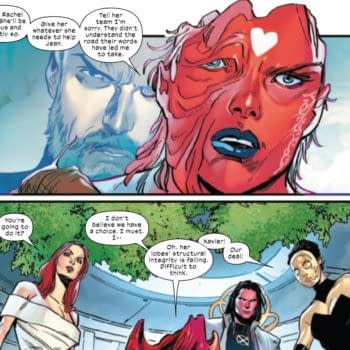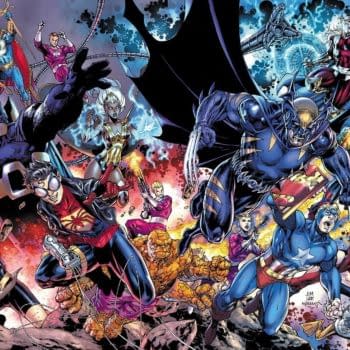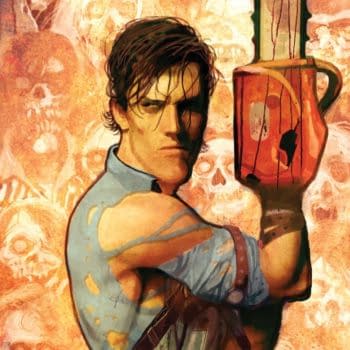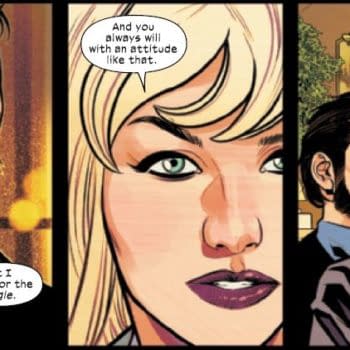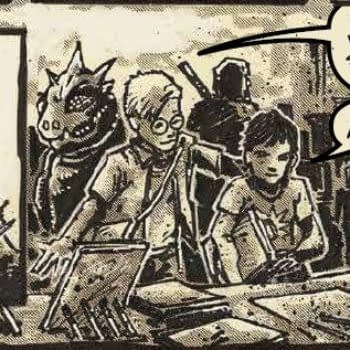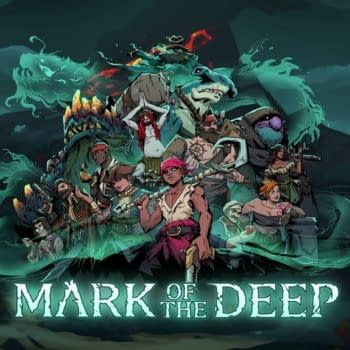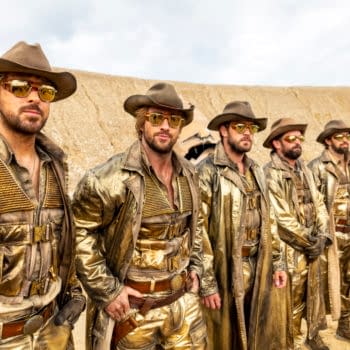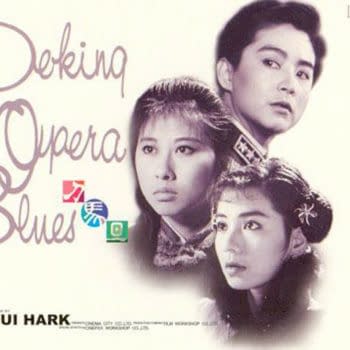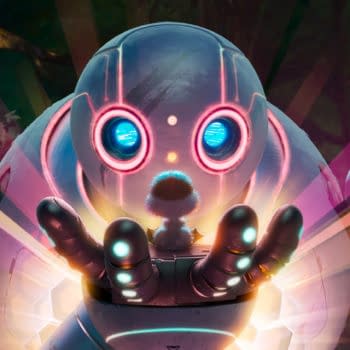Posted in: Games, Look! It Moves! by Adi Tantimedh, Movies | Tagged: entertainment, games, the witcher
Playing The Existential Outsider Hero Of The Witcher – Look! It Moves! by Adi Tantimedh
Adi Tantimedh writes,
I've been having a grand old time playing The Witcher 3: Wild Hunt in the evenings the same way I might watch a TV show or read a book, a couple of hours at a time because there are reportedly about 200 hours' worth of things to do in the game besides the story mission.
The Witcher series is a game that actively wants you to be immersed in the story, in the saga of Geralt of Rivia, a witcher, a monster-hunter-for-hire wandering a feudal Europe of warring states, magic and supernatural creatures. It is, as you expect, a power fantasy with a badass hero, but it's nuances are more interesting than the usual fantasy adventure. Where most fantasy stories feature heroes who fight for King and Country, often defending a realm or fighting to restore it after an enemy has conquered it.
[youtube]https://www.youtube.com/watch?v=1-l29HlKkXU[/youtube]
Based on the novels by Andrzej Sapkowski, Geralt of Rivia does not serve kings or lords. Witchers follow a strict code of neutrality and avoid getting drawn into politics or power plays. They don't save the world or take sides in wars. That said, Geralt often gets drawn into the schemes of lords and kings, criminals and sorcerers with their own agendas. He is justifiably wary of being at the mercy of their whims and caprice. Where games like Dragon Age: Inquisition have you playing a hero in an epic where he or she amasses power and ends up becoming a major player in the fate of nations, Geralt remains standfastly humble, only fighting to defend himself or when he's paid to rid a town of a werewolf or demonic drowners preying on the locals. Life in the world of the Witcher is nasty, brutish and short. All kings are bastards, some of them more fair than others, some less vicious than others, but ordinary people are forever at the mercy of their ambitions and plays. Geralt might become a catalyst in the outcome of some of their schemes and strategems, but he has no illusions of righteous rulers or meaningful change. Many medieval fantasies tend to be conservative in their pro-monarchy subtexts, including Game of Thrones, where they hold a belief that things would eventually be well if only the right ruler were put in place. The Witcher novels and games have a rare, subversive, left-wing view of kings, war and authority. They demand that you refuse to accept anything at face value, to look deeper. The original stories all subverted fairy tales and folklore as metaphors for life in Eastern European. If you play the games with that in mind, you'll notice another layer of subtexts in the story and even the fights.
[youtube]https://www.youtube.com/watch?v=7i23ZDoxClk[/youtube]
It's interesting to me that Sapkowski started writing the stories in 1986, when the Cold War and the Iron Curtain were still in full swing, and the socialist view has always been anti-monarchy. Geralt is an existential loner hero rather than a pro-establishment agent who joins an army and swerves King and Country. He views society from the outside, since he's a mutant, so he is the Other that people shun, and his friends tend to be fellow outsiders who suffer discrimination: sorceresses, dwarves, bards, criminals and prostitutes. He has a respect for the non-human creatures he might hunt or parley with because he knows he is one of them. When you read the stories or play the games, you can't escape being Geralt, the outsider, the wandering warrior who comes to town to take care of a problem, then collects his coin and leaves before he overstays his welcome and the townsfolk decide to find someone new to blame their problems on.
[youtube]https://www.youtube.com/watch?v=FcogCjLymeI[/youtube]
I don't have enough information to confirm this, but it seems the popularity of the Witcher series in Poland makes Geralt the equivalent of a popular pop culture hero there the same way Batman, Superman or Doctor Who are in the West. The popularity of the original books in the 1990s – two short story collections and five novels – spawned a series of comics in Poland with excellent writing and art (and still not published in the West), a terrible TV series and movie, and inspired rock songs as far afield as Russia. The game series is actually a sequel to the novels, though Sapkowski doesn't consider it canonical to his original books. The games are written by obvious fans of the books who know the lore and characters inside-out and faithfully portray the characters from the novels with shout-outs to fans of the books as well as newcomers, which is just as well, because the majority of Western fans would only know the series through the games rather than the books.
I can't help thinking Geralt is an archetypal Eastern European hero: laconic, plays his cards close to his chest, protective of his integrity and hidden heart. He – and the story – also have a sardonic, mordant sense of humour. He's baffled with women but is drawn by a love he barely admits to. The story of the Wild Hunt is also about a man facing the anxiety of middle age, regrets and duty to his daughter. His greatest loss would not failing to defeat monsters but failing his daughter. You could say this is part of the trend of Dad Games that are finding their way into the medium as games developers face aging and parenthood. You could take weeks, even months to unpack the meanings and themes in The Witcher: Wild Hunt.
Now I wish someone would just publish those original Polish graphic novels of The Witcher, which were better than the rather generic new ones from Dark Horse.
Witchering at lookitmoves@gmail.com
Follow the official LOOK! IT MOVES! twitter feed at http://twitter.com/lookitmoves for thoughts and snark on media and pop culture, stuff for future columns and stuff I may never spend a whole column writing about.
Look! It Moves! © Adisakdi Tantimedh








